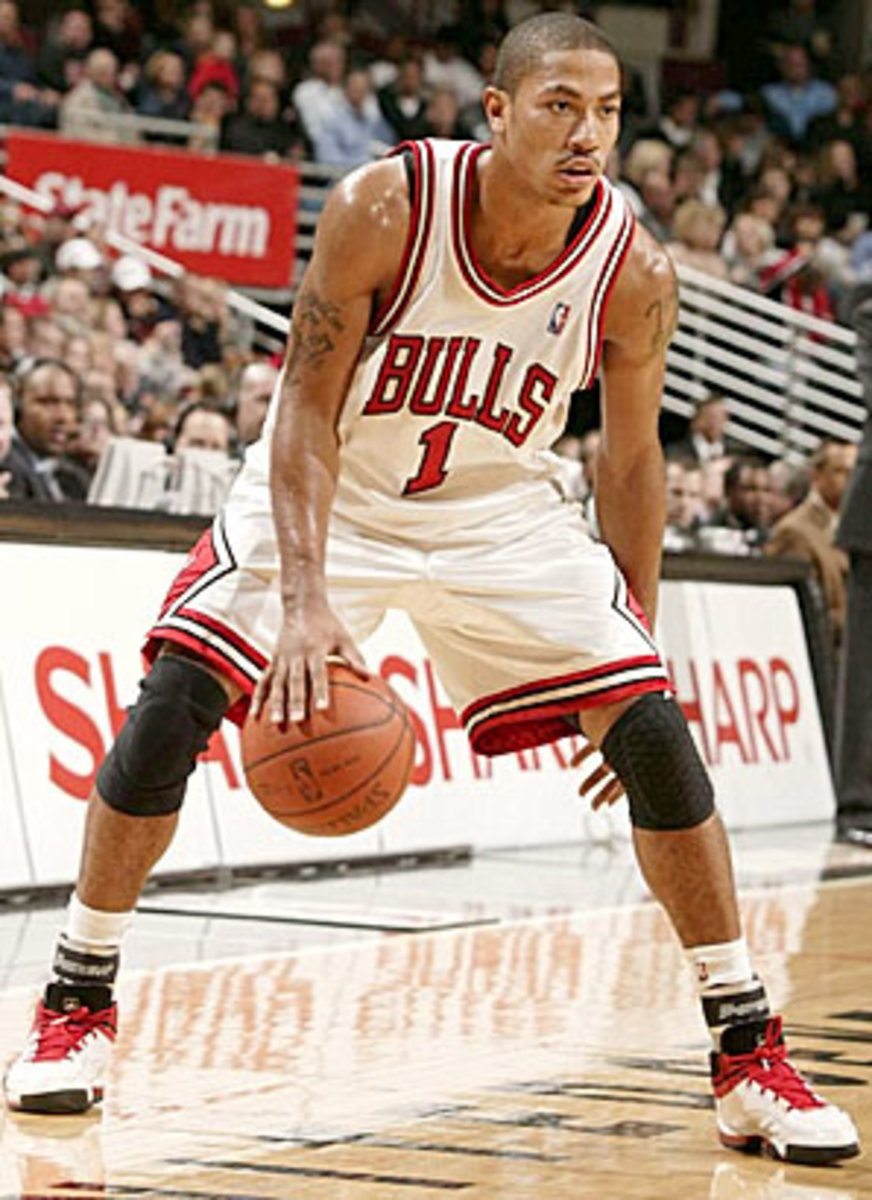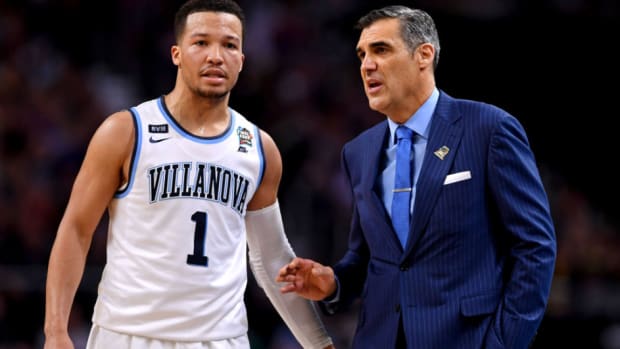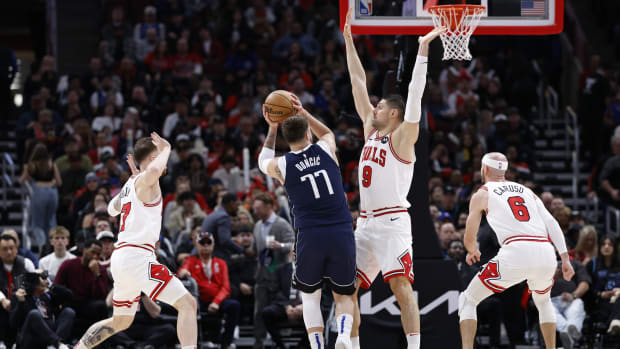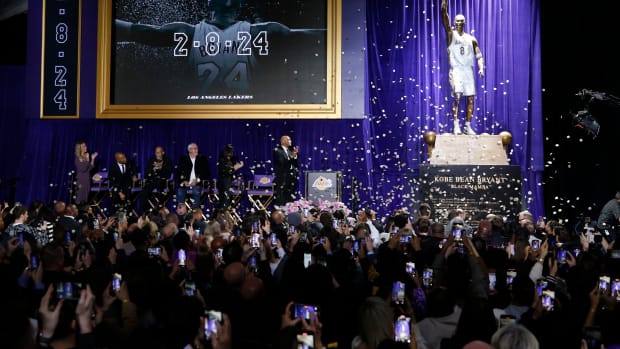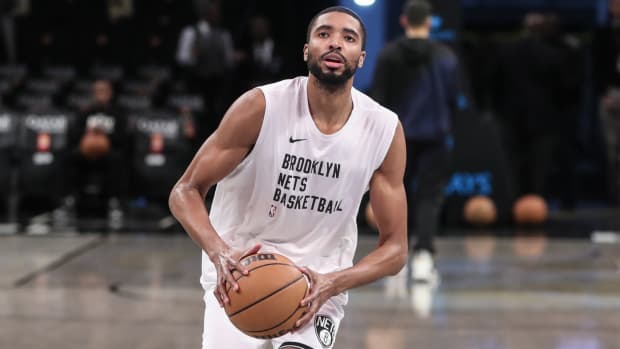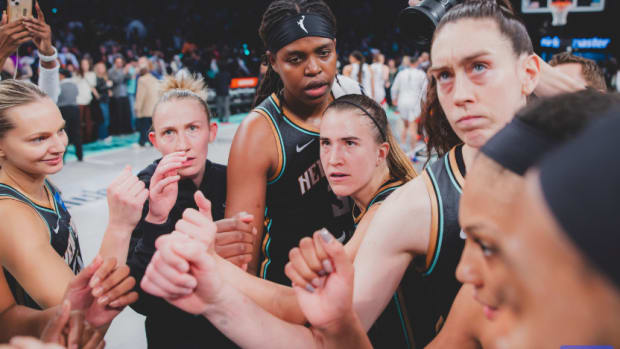Roundtable: Early rookie returns, East improvements and more
1. Which rookie has impressed you the most so far?
Ian Thomsen: The Bulls' Derrick Rose (18.9 ppg, 5.6 apg, 5.0 rpg, 46.8 FG%) looks like a No. 1 pick. I was expecting him to need a year to develop because he had only the one season at college, but he's establishing his speed and playmaking instincts as NBA strengths already. The two Memphis rookies have been strong; O.J. Mayo is the ready-made star he was supposed to be, and Marc Gasol looks like a true center. If the Blazers live up to their ultimate potential, then Rudy Fernandez is going to be one of their stars. You can see it in him already.
Marty Burns: Rose is not only putting up good numbers but he's also doing it while leading his team. The Bulls basically have turned over the reins to their rookie point guard, and he has responded like a 10-year pro. Mayo has had some dazzling scoring nights, Miami's Michael Beasley has been doing his thing, and Portland's Greg Oden might end up playing a key role for a top-tier team. One of them might even deserve to be Rookie of the Year when it's all said and done. But no one has impressed me as much as a 19-year-old kid playing the QB position in his home city for a team with no superstar (but four shooting guards who all think they should be starting) and a rookie coach.
Jack McCallum: Rose is near the top in every category he should be near the top in. I've been gushing about him for months and will continue throughout the Gushing Season. Not sure when that ends.
Chris Mannix: Several rookies have been impressive (Mayo, Rose, Beasley, Gasol), but the one I have been most impressed with is Jason Thompson. When the Kings took Thompson with the 12th pick, I was ready to engrave his name on the 2008 Draft Bust Award right then and there. But Thompson has been solid and, at times, spectacular. He is averaging 11.5 points and 6.5 rebounds in 25.6 minutes, and has shown the ability to swing between both forward positions. He may not turn out to be a star like Rose or Beasley, but the Kings may have found themselves a starting forward for the next decade.
Steve Aschburner: It's hard to quibble with Rose's early production while shouldering the pressure of being the No. 1 pick. Mayo is getting every opportunity to succeed in Memphis and mostly seizing them. But the guy who caught my eye on opening night was Sacramento's Thompson. He had 18 and 10 against Minnesota, and totaled 31 points and 20 boards in back-to-back games last week against the Pistons and Clippers. He hasn't blocked a shot in more than two weeks, but he's got a long, lively build and a swell future.
2. Through Monday, the much-maligned East held a 31-15 advantage in games against the West, which has long been viewed as the dominant conference. How would you assess the balance of power between the two conferences right now?
Thomsen: From top to bottom, the East is better. Right now, every team in the East could challenge for the playoffs (including the young Nets around Vince Carter), while 10 at most in the West could contend (the Lakers, Phoenix, Utah, New Orleans, Houston, San Antonio, Portland, Denver, Dallas and Golden State).
Another way of looking at it is to ask whether the West's top five or six teams will be superior to the East's elite; in that sense, I think the West may be better, after the Jazz's Deron Williams and the Spurs' Manu Ginobili and Tony Parker are fully recovered, and the Rockets and Mavericks have grown more comfortable in their new systems.
Burns: The East has definitely closed the gap. I'd probably still take any of the top four West teams to win the title over, say, the Cavs or the Pistons. But the Celtics are the defending champs, and the East is actually now the tougher conference from top to bottom. In recent years, the West has seen the Kings, Timberwolves, Grizzlies and Sonics (now Thunder) go into serious rebuilding mode. Throw in the reeling Clippers and Mavs, and there are a lot of easy Ws against the West these days.
McCallum: I break down conferences into three categories: Would Love To Play Them; Don't Mind Playing 'Em Although I'm Not Crazy About It; Don't Want To Play 'Em, Period. The East has one team in category No. 3, Boston, and one of the second variety, Cleveland. The West also has only one Don't Want to Play 'Em, the Lakers, but a whole bunch of No. 2s (Utah, Houston and Phoenix right now, New Orleans and San Antonio when they get straightened out and maybe Portland by the end of the year). The West still has a lot more quality.
Mannix: Is the balance of power starting to shift? Yes, slowly. But injury issues (Williams, and Parker and Ginobili) and slow starts (Dallas, New Orleans) have had more of an impact on that lopsided record than a significant shift in power. If you were to rank the top 10 teams in the league (assuming full strength), they are, arguably, in some variation of this order: Lakers, Celtics, Rockets, Hornets, Cavs, Pistons, Jazz, Suns, Spurs and Nuggets. That's seven of 10 residing in the West.
The East has a plethora of nice stories, including the Knicks' early success under Mike D'Antoni and Atlanta's strong start. But when healthy, the West is still significantly superior to the East.
Aschburner: The commissioner has always trusted the pendulum effect, relying on the draft and free agency to shift power back and forth, and he's looking smart again. Ups and downs in the West are sort of canceling each other out; Dallas, San Antonio and Phoenix are or will be in decline while New Orleans, Portland and Houston ascend. In the East, though, with the exception of Boston, Detroit and Cleveland, there was nowhere to go but up. Now New York, Atlanta, Orlando, Toronto, Philadelphia and Miami offer entertainment, potential or both.
3. Shaquille O'Neal recently told the Sacramento Bee that he and Kobe Bryant are the best one-two punch in Lakers history. Is he right?
Thomsen: You could argue that they had the most explosive punch. But they wasted too much time arguing and wanting to punch each other. Magic Johnson and Kareem Abdul-Jabbar won five championships together -- two more than Shaq and Kobe -- and they got along despite their personality differences. Those 1980s Lakers team dominated the golden era of basketball, and while James Worthy and others provided a lot of help, I still give Magic and Kareem the advantage.
Burns: We'll go along with Shaq on this one. He and Kobe probably were the best Lakers 1-2 punch -- at least in the strictest sense.
Jerry West and Wilt Chamberlain won the 1972 title together, but Gail Goodrich was also on that club. Goodrich, in fact, led that team in scoring. Magic and Kareem won five championships together, but they got a lot of help from James Worthy, Byron Scott and Kurt Rambis on those Showtime teams.
Shaq and Kobe pretty much were the show during their Lakers' three-peat. They led those teams in scoring all three times by large margins. When NBA fans think about those teams 20 years from now, they will think of Shaq and Kobe. I don't think those other Lakers clubs will be remembered as two-man teams.
McCallum: As usual, the Big Overstater was a bit prone to, well, overstatement. I do rank Shaq-Kobe ahead of Baylor and West since the latter combo did not produce a championship in their 10 full seasons together, an injury having cut short Baylor's season in 1972, the year that L.A. won a record 33 games in a row and finally beat back the Celtics to win a championship. But the best West Coast combo, clearly, consisted of Magic and Kareem. Magic extended Kareem's career several years with his exuberant leadership, and Abdul-Jabbar's reliable inside scoring padded Magic's assist total from the outset of his career.
Mannix: That's a stretch, even though Shaq and Kobe absolutely belong in the realm of Lakers immortals. The Kareem-Magic one-two punch was better, having dominated an era that was far deeper than the one O'Neal and Bryant tore through.
What's more, Shaq knows that's true. He has already admitted that most of what he says is for effect, with the intent of being marketable. He knows what he says will stir the pot and brighten the fading spotlight that surrounds him. It's what he's good at. And he has done it again.
Aschburner: At one point in O'Neal's interview, he qualifies that one-two punch boast by specifying "best Laker guard-center punch.'' Later he drops in a label of "most exciting, most controversial and the best.'' So to me, that makes him a) wrong, b) wrong and c) two-thirds right.
Let me explain: The best one-two punch in Lakers history was West and Baylor. Those two Hall of Famers, in their prime, were the most formidable pair of wing or perimeter scorers in NBA history. They had three seasons in which their combined scoring average topped the best ever produced by O'Neal and Bryant (57.5 in 2002-03). West and Baylor combined for 69.1 points in 1961-62, 61.1 points the following season and 58.1 points in 1964-65.
The best guard-center punch, meanwhile, was Magic and Kareem, on the basis of five championships to three for Bryant-O'Neal. They didn't score like the more recent tandem but they stayed great for a decade, not half of one. (I'll note here, too, that in 1969-70, West and Wilt Chamberlain combined for 58.5 points -- with Baylor chipping in 24.0.)
Most exciting? I'll give Shaq that. The combination of his thunder and Bryant's lightning was stupendous. Most controversial? No other pair is even close. But best? Not quite.
4. The Clippers are 1-9 after Monday's loss to the Spurs. Are they this bad?
Thomsen: The issue for the Clippers always was going to be fitting the parts together -- big men Chris Kaman and Marcus Camby (who has been hurt), coach Mike Dunleavy and point guard Baron Davis (who has been hurt). They have too much talent to play this poorly all season. But is this roster ever going to exceed the sum of its parts? I doubt it.
Burns: No. The Clippers have talent. They've just been caught up in the perfect storm of a lot of new faces, injuries and strong egos. The problem now is that the bad start is ruining morale and causing dissension. Davis has clashed with Dunleavy, and some of the other vets seem to be going their own ways. L.A. still has time to turn it around and maybe get back in the race for the No. 8 spot, but it won't happen if Baron and his mates don't buy into Dunleavy's system.
McCallum: Put it this way: Regarding my answer to the East-vs.-West question, the Clips are under the category of Would Love To Play Them Every Night Even If We're Forced To Wear Heavy Raincoats And Those Old-Fashioned Galoshes Your Mother Made You Put On Even When There Was Only A Light Drizzle.
Mannix: Yes.
Oh, we're supposed to elaborate? The Clippers have Ricky Davis, who seemingly brings 10 losses to a team the minute he signs a contract. They have Baron Davis, who is struggling to blend his freelancing style with Dunleavy's frequent play-calling. They have two centers (Kaman and Camby) who are still trying to figure out a way to play together. They are giving up 102 points a game and getting beat by an average of 12.8 points.
The bottom line is that while second-year forward Al Thornton and rookie guard Eric Gordon are decent building blocks, the Clippers need a massive overhaul. And it could start with Baron, who may start to pack it in if the losses continue to pile up.
Aschburner: They aren't win-one-out-of-every-10 bad, because that would be historic, challenging the 1972-73 Philadelphia 76ers' 9-73 mark. But they are bad, with signs that things won't be getting all that much better. Gordon has started way slower than I expected; he's averaging just 12.0 minutes and has made only 11-of-32 shots. Ricky Davis, meanwhile, is playing almost twice as much as Gordon -- while making only 11 of his 35 two-point shots -- and we've all seen how teams do when Davis is a key contributor. Going forward, it might be too much to expect Camby (34 now and brittle even in his 20s), Kaman and Baron Davis to all avoid lengthy injury layoffs.






























